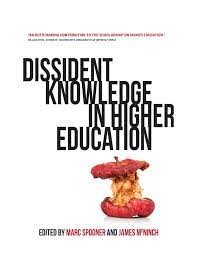In 2015 a symposium was held at the University of Regina on "Public Engagement and the Politics of Evidence in an Age of Neoliberalism and Audit Culture", which went on to be the basis of the book "Dissident Knowledge in Higher Education", published in 2018 by the University of Regina Press. The book is edited by Marc Spooner and James McNinch. I share many of the concerns raised in the chapters, and have written about some of them myself. Rather than share a few quotes, as I typically do, I will reflect on some of the tensions that emerge when reading this book. Before moving to those tensions, this book is quite North America centric, and as I read this in Ethiopia in 2022 the situation is partly similar but also notably different (so, the title might be better specified about particular types of higher education).
- One tension concerns freedoms: it is suggested that the "Right" should not be free to speak and hold events (we should protest against this), but the "Left" needs to vigorously defend its freedom to do so. One author described this as "playing both sides of the free speech fence", but is a tension that exists between chapters (and between examples used within chapters).
- Similarly, the university should be a site for organizing (as a primary function), but not be a space where the "Right" is allowed to organize, which should be resisted.
- Social media is a positive way to engage new audiences and activism, and is negative as an intrusion into the personal lives of faculty that make academic freedom more fragile.
- Research should have positive impacts on well-being and improve society (and we should know that our work is enabling positive change), but the orientation of research toward impact or attempts to assess impact are negative aspects of a burdensome neoliberal audit culture.
- The university should be public and for the public good, embodying the values of good governance, but transparency of the university institution to the public (and the processes that would do that) are bad (e.g., making course outlines available to the public).
- Many actors in society (corporations, political parties, lobbyists) are acting unethically and there is a need for oversight and regulation, but researchers see ethical regulation of themselves as negative, burdensome audit culture.
- Governments should be accountable to the public, including being able to access data such as via Freedom of Information Requests, but government-funded public universities and their employees should not be subject to these same accountability processes (viewed as intrusions into academic freedom).
- Good policy should be thoroughly assessed and evaluated, but research and teaching should not be thoroughly assessed and evaluated (the standardizations that result from assessing large institutions in particular, with no proposed alternatives).
- Tenure processes entrench privilege such that some people disproportionately retain positions of power, but tenure must be protected as the neoliberal university erodes tenure and expands contract-based teaching.
Not all of these tensions are mutually exclusive. I raise them as interesting questions that the book largely does not explore, but ones that need to grappled with.


